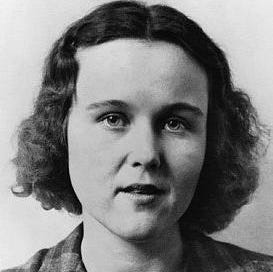Malice & the Unknown
by Elisa Gabbert
One night, drunk at a party, William Burroughs
suggested a round of William Tell.
His pretty young wife put a highball glass on her head. It
may have had gin in it.
He shot her in the face, from six feet away.
Burroughs was a good shot—but also very drunk. And
witnesses report he looked shocked by what he’d done.
But William and Joan had never played this game before.
We can never know if he meant to do it. We can never
really know.
We can never, ever, ever know.
This helps me think about infinity.
Increasingly, I do things to distract me from my thoughts.
The distraction helps my thinking.
it complicates my thoughts—it adds a mood, like
background music.
It makes me interesting to myself.
I once heard someone say, That’s like drinking to remember,
but I like drinking to remember.
I like when bad things happen, but not the ones I was
expecting.
I like when something feels like a placeholder that never
got replaced.
I like the feeling of starting to like a thing I used to hate.
Like cheating on myself.
I like how you remember your hotel room number for the
length of your stay, and then it’s gone from your mind
forever.
I like to think about infinity, the curve that approaches the
asymptote
I like to think about the difference between hearing
someone lie and watching someone lie.
A difference of point of view—their point of view, not mine.
There are orders of infinity, infinite sets that are not only
larger but infinitely larger than the first order of infinity—
but you know all this.
I like thoughts before they coalesce into “thoughts.”
Before-thoughts.
I like when people lie a little bit and then admit it.
I like when there are buildings on the sides of mountains.
I like when there’s a hole in the roof of a building, to watch
clouds blow through.
Norman Mailer, also drunk at a party, stabbed his wife—
twice—almost in the heart—but did not kill, did not
succeed in killing her.
You know this, you know this.
If there are infinite points between 0 and 1, there is infinite
past, infinite points that must stay in the past, where they
can be protected.
The past. It’s so still.
i am sending this poem for a very specific reason, which is that just last night at my holiday party i learned the story of william burroughs killing his wife. phil informed us of this, and then we spent probably too long unpacking it and VERY confused about it. multiple wikipedia pages were read, many questions were asked (nobody at the party was like hey man, maybe put the gun away?). the whole ordeal felt mystifying. then this morning i was at a bookstore holiday shopping. i always go to the poetry section and browse, and i picked out a random book, no particular thing drew me to it. and then i opened the book to a random page, and this was the poem on the page!!! always strange and exciting when those things happen. so truthfully i have not thought that much about this poem, and there is so much in it that has nothing to do with the william s. burroughs story that i love love love. but this is what i can articulate— talking about william burroughs’ murdering his wife is a weird lead-in to talk about infinity! but of course, the fact that we will never, never, never know the true intention of the killing makes the past infinite, makes the unknown infinite, and in all the infinity the past, the unknown, become completely still. the past is not still—here we are at a party decades later playing the scene over and over again trying to understand. there is so much information floating out there (in one account joan died instantly, in another account it took her several hours to die)--it’s having already happened makes it seem set in stone. i love the line about “before-thoughts”— once a thought becomes a real thought, is that when it becomes still? xo sam


